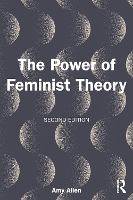


|
|
|
books
| book details |
The Power of Feminist Theory: Domination, Resistance, Solidarity
By (author) Amy Allen

|
This book is currently unavailable. Enquire to check if we can source a used copy
|
| book description |
In this new second edition of The Power of Feminist Theory: Domination, Resistance, Solidarity, Amy Allen diagnoses the inadequacies of previous feminist conceptions of power, and draws on the work of a diverse group of theorists of power, including Michel Foucault, Judith Butler, bell hooks, and Hannah Arendt, in order to construct a new feminist conception of power. The conception of power developed in this book enables readers to theorize domination, resistance, and solidarity, and, perhaps more importantly, to do so in a way that illuminates the interrelatedness of these three modalities of power. The new edition of this foundational text includes substantial new material on intersectionality and power, transnational feminism and power in relation to homonationalism and neo-imperialism, and empowerment feminism. It addresses important criticisms of Foucault, Arendt, and Butler that have been raised by Black feminists, critical philosophers of race, postcolonial theorists, and Marxists. The Power of Feminist Theory: Domination, Resistance, Solidarity is an essential text for students engaging with feminist analyses of power, feminist theory and feminist political thought.
| product details |
Normally shipped |
Publisher | Taylor & Francis Ltd
Published date | 17 Jun 2025
Language |
Format | Digital (delivered electronically)
Pages | 186
Dimensions | 0 x 0 x 0mm (L x W x H)
Weight | 0g
ISBN | 978-1-0403-7095-7
Readership Age |
BISAC | social science / gender studies
| other options |
|
|
|
To view the items in your trolley please sign in.
| sign in |
|
|
|
| specials |
|
|
|
Let's stare the future down and, instead of fearing AI, become solutionists.
|
This first comprehensive biography of Cecil Rhodes in a generation illuminates Rhodes’s vision for the expansion of imperialism in southern Africa, connecting politics and industry to internal development, and examines how this fueled a lasting, white-dominated colonial society.
|
|
|
|